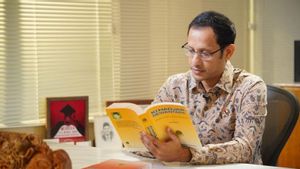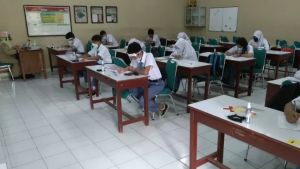YOGYAKARTA – Questions asked by children often trigger feedback, where do they get the discourse about the word or topic that they ask? According to Vanessa LoBue, Ph.D., professor of psychology at Rutgers University-Newark, children are extraordinary learners. Even the words you don't say, they can absorb. Children aged 1 to 2 years, can learn between 8 to 10 new words in a day. So, how to do optimal learning outside of formal education?
Neuroscientists have confirmed that babies are born with an excess of their brain. As reported by Psychology Today, Monday, May 16, connections between neurons are the most basic part of the brain. These connections make the baby's brain very flexible to adapt and change based on what they experience in the world and the specific challenges they face.
This flexibility is what researchers call plasticity. Because of this plasticity, babies have a tendency to learn that adults don't have. Researchers found that babies aged 7 months can distinguish sets of sounds. They can differentiate between English and Hindi. While native English speakers can't even hear the difference between the many Hindi sounds.

Another amazing ability, babies can distinguish different types of faces, regardless of species. Researchers tracked how correctly 6-month-old babies identified the same face from two photos. Even babies give more correct answers than adults.
Well, by researchers, this phenomenon is called narrowing of perception. This refers to the fact that when we are born, the brain is flexible enough to distinguish different faces and languages. But as we gain more experience with the same face and language, we lose the ability to distinguish things we don't see often.
The next phenomenon is called 'use it or lose it', it is related to the efficiency of the brain in processing information. This happens as babies gain more experience with the world, many of the synapses they were born with are trimmed and leaving only the ones they use. Due to this, parts of the brain are like sponges but then become more efficient at filtering out which information is important and what is not overtime.
SEE ALSO:
When it comes to language learning, scientists believe that there is a specific time window in which a child's brain optimally absorbs and learns language-related information. Researchers have studied language fluency between the ages of 3-39 years. The younger they are, the more fluent they will be at completing the language test.
Since children are good learners, there is a slight downside to this. They may learn things their parents don't want, such as harsh words. Therefore, filtering information and controlling the words that children catch is very important. In fact, parents need to accompany and provide them with positive contexts.
The English, Chinese, Japanese, Arabic, and French versions are automatically generated by the AI. So there may still be inaccuracies in translating, please always see Indonesian as our main language. (system supported by DigitalSiber.id)


















